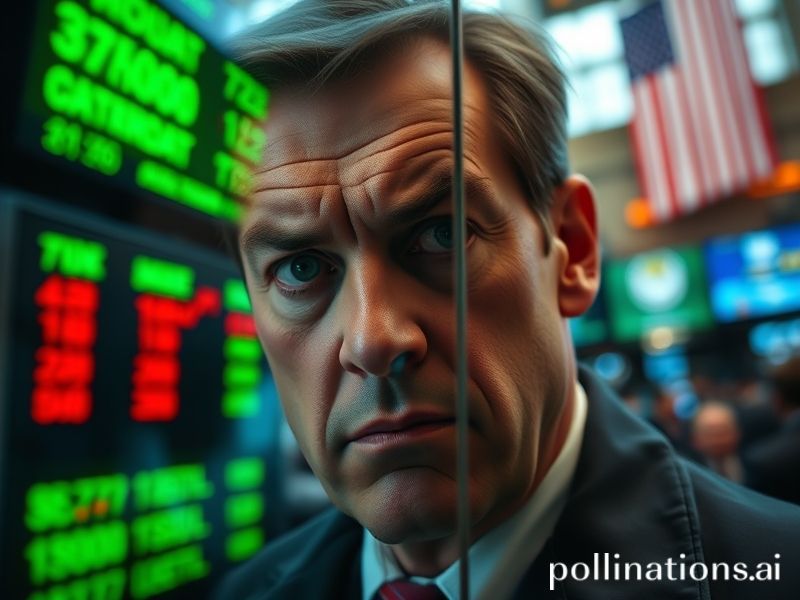stock market today
Markets Swirl Like Cheap Tequila: A Global Hangover Report
By our man in the departure lounge, nursing espresso and regret
Tokyo opened first, because someone has to, and the Nikkei greeted the dawn like a salaryman discovering the karaoke tab from last night: down 1.4 %, then up, then sideways, as if the index itself was trying to locate its own wallet. Analysts blamed “mixed signals from the Fed,” which is finance-speak for “we’re making this up as we go.” Meanwhile, in Sydney, iron-ore futures slipped on rumors that China might—brace yourselves—actually enforce its own environmental regulations. The Australian dollar sighed, bought a flat white, and resolved to emigrate.
Hong Kong tried to stage a rally, but the Hang Seng tripped over a fresh Beijing compliance directive and face-planted into a 2 % loss. Traders who once boasted about “riding the dragon” now complain the dragon has installed speed cameras. Over in Mumbai, the Sensex shrugged off the carnage and nudged higher, proving that nothing inoculates optimism quite like a national election season and a captive audience of 1.4 billion retail investors who still believe their uncle’s stock tip is better than a CFA charter.
Europe clocked in late, as usual. The DAX attempted to look industrious, Volkswagen nudging up on promises of more electric vehicles nobody asked for. Paris sipped a Gauloise and muttered about pension reform while the CAC 40 flat-lined; apparently even algorithms are on strike. London, meanwhile, celebrated the Bank of England’s latest “hawkish pause” by devaluing the pound an additional 0.3 %, a move the tabloids hailed as “keeping British exports competitive, innit?” Financial tourists from the Gulf watched from Harrods’ windows, wondering why everything is suddenly on sale except the UK housing market, which remains comically unaffordable—possibly the last reliable British export after sarcasm.
Across the Atlantic, Wall Street arrived fashionably hungover. The S&P 500 spent the morning debating whether inflation is transitory, sticky, or just a gluten allergy. Tech giants oscillated like mood-ring teenagers: Nvidia soared on rumors of an AI that can write its own SEC filings, while Meta dipped after Zuckerberg announced legs for avatars—finally solving a problem no human has ever complained about. Bond yields crept higher, which is code for “someone somewhere is getting margin-called, and it’s probably a pension fund in Ohio.”
Latin America checked its phone at brunch. Brazil’s Bovespa flirted with green on the back of soy futures and political circus trailers—both abundant local commodities. Mexico’s peso strengthened after the central bank hinted it might keep interest rates above inflation, a concept the Fed calls “quaint.” Argentina, ever the avant-garde, simply stopped publishing official statistics; why let data ruin a perfectly good narrative?
Africa logged in on patchy Wi-Fi. Johannesburg’s miners rose on gold’s safe-haven glow, because nothing says “modern economy” like reverting to shiny rocks when the Wi-Fi drops. Nairobi’s tech startups—fueled by diaspora remittances and hope—barely noticed the global tremors; when your baseline is daily power outages, a 2 % swing in NASDAQ feels like a rounding error.
By late afternoon, every screen on earth displayed the same red-green kaleidoscope, a Rorschach test for our collective denial. Headlines toggled between “Buy the dip” and “We’re all doomed,” proving that financial journalism is just astrology for people who know what EBITDA stands for. Central banks from Ottawa to Ankara promised “data-dependent vigilance,” which is central-banker for “we’re watching Netflix with one eye on the printer.”
And yet, life persists: container ships still slide through Suez, for now; Bitcoin miners still melt glaciers so someone can own a pixelated ape; and your cousin still texts that he’s “diversifying into NFTs of diversified ETFs.” The planet spins, the tickers flicker, and somewhere a quant in Zurich updates his CV in LaTeX, praying the next crisis is denominated in francs.
Conclusion
So ends another day in the great global casino, where the house always wins but graciously lets us keep the chips for appearance’s sake. Remember: the market can stay irrational longer than you can stay solvent, but it can also stay rational just long enough for you to believe it won’t stab you in the back. Place your bets accordingly—preferably with someone else’s money.







